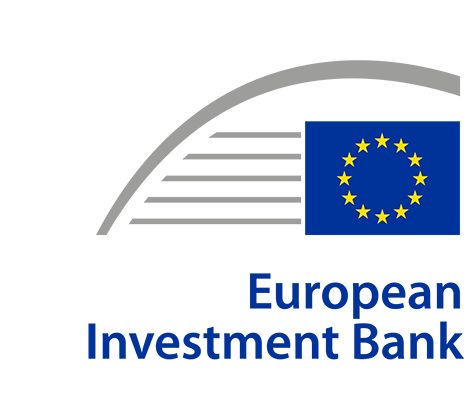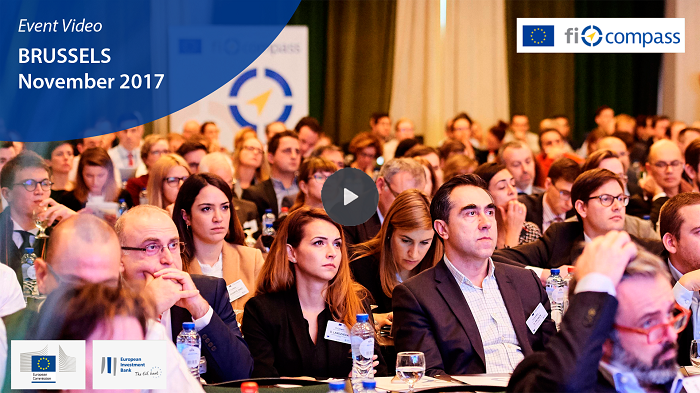FI Campus event: 'Financial instruments under the European Structural and Investment Funds (ESIF) in the 2014-2020 programming period'
Overview
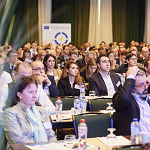
Picture: Event overview
FI Campus, organised by the European Commission (EC) in partnership with the European Investment Bank (EIB) from 29 November to 1 December 2017 in Brussels, focused on the implementation of financial instruments under the European Structural and Investment Funds (ESIF) in the 2014-2020 programming period. The event brought together over 350 participants from managing authorities, bodies implementing or considering to implement financial instruments as well as other financial instruments stakeholders from across the EU.
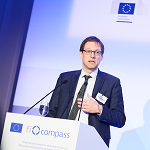
Picture: Eric von Breska, Director Policy Directorate, DG REGIO, European Commission
Financial instruments as a key delivery option in 2014-2020 and well underway
In his opening speech, Eric von Breska, Director at the Policy Directorate, Directorate-General for Regional and Urban Policy (DG REGIO), European Commission, highlighted the key role played by financial instruments as a delivery mechanism of ESI Funds. It is essential to building further knowledge and capacity of all stakeholders in order to effectively deliver more and more ESI funding through financial instruments, which is one of the main goals of the Investment Plan for Europe.
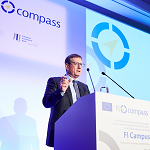
Picture: Simon Barnes, Director, Advisory Services Department, EIB
Simon Barnes, Director of Advisory Services Department, EIB, underlined that financial instruments are no longer deployed by a ’small group of pioneers’ but are in the mainstream of European funding. It is the growing expertise of practitioners from across all the Member States that is now driving the success of financial instruments in the current programming period.
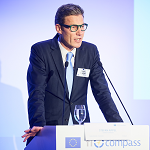
Picture: Stefan Appel, Head of Financial Instruments and IFI Relations Unit, DG REGIO, European Commission
Stefan Appel, Head of the Financial Instruments and International Financial Institutions Relations Unit, DG REGIO, summarised the success story and presented concrete results of financial instruments under ESIF so far. In 2007-2013, some 1000 financial engineering instruments (FEI) were set up in 25 Member States, leading to concrete results: 155.000 loans to final recipients, 146.000 recipients benefited from guarantees and other risk-bearing products and ca. 4.500 recipients of equity and quasi-equity supported by financial instruments. The set-up and implementation of financial instruments in 2014-2020 is well underway and the results of financial instruments in the current period will be published soon.
Lessons learnt from 2007-2013 – EC Regulatory framework related to financial instruments
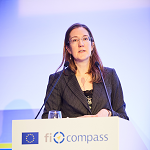
Picture: Rachel Lancry-Beaumont, Deputy Head of Financial Instruments and IFI Relations Unit, DG REGIO, European Commission
To encourage further expansion and strengthen the use of financial instruments, the 2014-2020 Regulatory framework offers Member States and managing authorities more programming possibilities, new implementation options and additional financial incentives. Throughout the first two days of FI Campus, participants had the opportunity to hear from and engage with key representatives from the European Commission on the EC Regulatory Guidance related to ESIF financial instruments. Key topics: implementation options and selection, a combination of support (including with the European Fund for Strategic Investments – EFSI), state aid as well as management verifications and audit, were presented first-hand by European Commission experts. Roundtables provided additional exchange possibilities with the Commission experts and participants could test their knowledge in an interactive EC Guidance-related brainteaser.
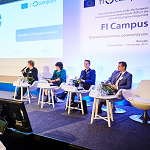
Picture: Katja Reppel, Deputy Head of Unit for Smart and Sustainable Growth, DG REGIO, European Commission, Aneta Stoica and Lucian Coman, Ministry of Regional Development, Public Administration and European Funds, Romania, Camelia Dragoi, European Investment Fund (EIF)
Financial instruments, powered by you – Sharing experience on how to get financial instruments going
The theme of FI Campus, Financial instruments, powered by you, reflected the importance of the experience of the growing community of practitioners who have set up and are now operating financial instruments to support investments in a diverse range of sectors. Experts from managing authorities, financial intermediaries and other stakeholders directly involved in the deployment of financial instruments from Germany, Hungary, Malta, the Netherlands, Latvia, Lithuania, Poland, Romania, Slovakia and Spain shared their experiences at FI Campus.
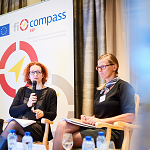
Picture: Aleksandra Dmitruk, Ministry of Development, Poland, Ms Agnieszka Waszkiewicz, Bank Gospodarstwa Krajowego (BGK), Poland
This included case study presentations and peer-to-peer roundtables dedicated to financial instruments supporting specific themes: research and innovation, SME competitiveness, low carbon economy and urban development as well two Thematic Objectives (TO) specific for the European Social Fund (ESF): social entrepreneurship and social inclusion as well as self-employment and entrepreneurship. In addition, a brainteaser on practical issues of deploying financial instruments gave participants an opportunity to test their know-how and discuss practical questions among each other.
Exploring market practices
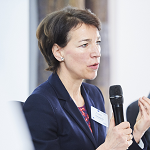
Picture: Irene Schucht, Investitionsbank Berlin, Germany
The third day of FI Campus focussed on market practices related to the deployment of financial instruments on the ground. Two parallel panels with a number of practitioners from financial intermediaries discussed the practical challenges of the deployment of equity (venture capital) as well as loans and guarantees (banks) in 2014-2020 with ESIF resources. During subsequent three parallel workshops with group tasks and subsequent discussions, participants had an opportunity to gain further practical insights specifically in the areas of project pipeline development, project management and monitoring as well as the criteria used to select financial intermediaries.
FI Campus – Bringing practitioners together

Picture: Event participants
The opportunity for participants to create their own individual learning curricula by choosing from a variety of parallel sessions on different aspects related to ESIF financial instruments of their particular interest was an important feature of all three days of the FI Campus event. Learning, sharing experience and networking between peers from the different Member States and regions as well as among different types of stakeholders, such as managing authorities and financial intermediaries, was facilitated by a variety of interactive session formats.
In the closing plenary, Stefan Appel, DG REGIO, underlined the importance of such fi-compass capacity building activities as FI Campus and encouraged participants to take part in the survey about the fi-compass advisory services. Frank Lee, Head of Financial Instruments Advisory Division, EIB, stressed the unique opportunity provided by FI Campus to discuss financial instruments topics directly with EC experts. Video testimonials from event participants recorded during the first two days of FI Campus were shown to the audience and results, experiences and lessons learnt from the event were reported by participants in a still very well-attended, last summarising discussion.
| Title | Speakers | ||
|---|---|---|---|
| |
Official opening of FI Campus and plenary session on ESIF financial instruments in 2014-2020 programming period |
Stefan Appel, Head of Financial Instruments and International Financial Institutions Relations Unit, European Commission (DG REGIO) |
|
| |
EC Guidance presentation State aid |
Egle Striungyte, European Commission (DG REGIO) Gabriela Tschirkova, European Commission (DG REGIO) Hanna Dudka, European Commission (DG REGIO) Vasiliki Avgoustidou, European Commission (DG REGIO) |
|
| |
EC Guidance presentation Implementation options and selection |
Oana Dordain, European Commission (DG REGIO) Andres Penuela Jimenez, European Commission (DG REGIO) Sandro Cavrak, European Commission (DG GROW) |
|
| |
EC Guidance presentation Combination of support (including ESIF-EFSI) |
Rachel Lancry Beaumont, European Commission (DG REGIO) Jörg Lackenbauer, European Commission (DG REGIO) Ricardo Pinheiro, European Commission (DG REGIO) |
|
| |
EC Guidance presentation Management verification and audit |
Rafael López Sánchez, European Commission (DG REGIO) |
|
| |
Case study presentation (ERDF) Enhancing the competitiveness of SMEs: Financial Instruments in Thuringia, Germany |
Andreas Beutel, Thuringia Ministry for Economics, Science and Digital Society, Germany Heike Gerhardt-Leißring, Thüringer Aufbaubank, Germany |
|
| |
Case study presentation (ERDF) Innovative financial instruments from the City of The Hague |
Ton Overmeire, City of The Hague, the Netherlands |
|
| |
Case study presentation (ERDF) Financial instruments for urban development in Poland EIB Fund of Funds, Silesia |
Piotr Skiba, European Investment Bank |
|
| |
Case study presentation (ESF) Social entrepreneurship and social inclusion: ‘National Fund for Social Entrepreneurship, Poland’ |
Aleksandra Dmitruk, Ministry of Development, Poland Agnieszka Waszkiewicz, Bank Gospodarstwa Krajowego, Poland |
|
| |
Cohesion Policy Support for Innovation in Europe's Regions |
Katja Reppel, European Commission (DG REGIO) |
|
| |
Case study presentation (ERDF) Financial instruments for Research, technological development and innovation for Romanian SMEs |
Lucian Coman, Ministry of Regional Development, Public Administration and European Funds, Romania Aneta Stoica, Ministry of Regional Development, Public Administration and European Funds, Romania Camelia Dragoi, Mandate manager, European Investment Fund |
|
| |
Case study presentation (ERDF) Experience with implementation of FI in Hungary |
Györgyi Nyikos, MFB Hungarian Development Bank, Hungary |
|
| |
Case study presentation (ERDF) Energy Efficiency Programme for Multi-Apartment Residential Buildings in Latvia |
Aleksejs Kaņējevs, ALTUM, Latvia |
|
| |
Case study presentation (ESF) Self-employment and Entrepreneurship: ‘Entrepreneurship Promotion Fund 2014-2020, Lithuania’ |
Rūta Dapkute, Ministry of Finance, Lithuania Inga Beiliūnienė, INVEGA, Lithuania |

